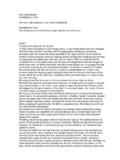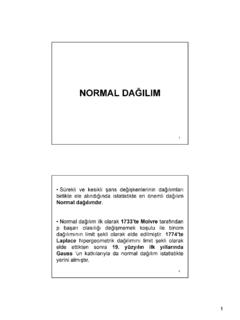Transcription of Chapter 6
1 OChapter 6 theories of GlobalizationWilliam I. RobinsonTHEORY AND THE RISE OF globalization STUDIESG lobalization is reshaping how we have traditionally gone about studying the social world and human culture and a fi eld of globalization studies is now emerging across the disciplines (Appelbaum and Robinson, 2005). These globalization studies arose around several sets of phenomena that drew researchers attention from the 1970s onwards. One was the emergence of a globalized economy involving new systems of production, fi nance and consumption and worldwide economic integration. A second was new transnational or global cultural patterns, practices and fl ows, and the idea of global culture(s) . A third was global political processes, the rise of new transnational institutions, and concomitantly, the spread of global governance and authority structures of diverse sorts.
2 A fourth was the unprecedented multidirec-tional movement of peoples around the world involving new patterns of transna-tional migration, identities and communities. Yet a fi fth was new social hierarchies, forms of inequality, and relations of domination around the world and in the global system as a scholarly literature on these phenomena has proliferated, as have specifi c studies of the impacts of globalization on particular countries and regions and on gender and ethnicity, not to mention much pop treatment of the subject. Recent research agendas have branched out into an enormous variety of topics, from tran-snational sexualities, to global tourism, changes in the state, the restructuring of work, transnational care-giving, globalization and crime, the global media, and so on.
3 This explosion of research points to the ubiquity of the effects of globalization . All disciplines and specializations in the academy, it seems, have become implicated in globalization studies, from ethnic, area and women s studies, to literature, the arts, language and cultural studies, the social sciences, history, law, business admin-istration, and even the natural and applied sciences. 1252/27/2007 3:55:57 PM2/27/2007 3:55:57 PMO126 william i. robinsonThe proliferating literature on globalization refl ects the intellectual enormity of the task of researching and theorizing the breadth, depth and pace of changes underway in human society in the early twenty-fi rst century. We fi nd two broad categories of research: (1) those studying specifi c problems or issues as they relate to globalization ; (2) those studying the concept of globalization itself theorizing the very nature of the process.
4 In a time when social relations and institutions are everywhere subject to rapid and dramatic change, and to the extent that this change is linked to globalization , theories of globalization are without doubt of major import to the contemporary world. How do we theorize this phenomenon which we will call globalization ? What types of theories have been developed to explain twenty-fi rst century social change? Are our existing theories adequate to capture this change, or do we need new theoretical models?If it is true that globalization is one of the key concepts of the twenty-fi rst century, it is also true that it is one of the most hotly debated and contested. There is no consensus on what has been going on in the world denoted by the term globaliza-tion ; competing defi nitions will give us distinct interpretations of social reality.
5 Hence the very notion of globalization is problematic given the multitude of partial, divergent and often contradictory claims surrounding the concept. Considering the political implications of these claims it is clear that, at the least, globalization has become what we refer to as an essentially contested concept. The contending bat-tleground of such concepts is a leading edge of political confl ict since the meanings of such concepts are closely related to the problems they seek to discuss and what kind of social action people will engage in. Knowledge claims are not neutral. They are grounded in situated social and historical contexts, often in competing social interests. Nowhere is this clearer than with globalization cannot here, given space constraints, take up the political and the normative dimensions of the globalization debate and the relationship of distinct theoretical discourses on globalization to these debates.
6 Nonetheless, it would be impossible to speak of globalization without reference to the highly confl ictive nature of the process. Diverse actors have associated globalization with expanding worldwide inequalities, new modes of exploitation and domination, displacement, marginaliza-tion, ecological holocaust and anti- globalization . Others have trumpeted the process as creating newfound prosperity, freedom, emancipation and democracy. These normative issues, whether or not they are foregrounded, will loom large in any survey of theories of globalization . How we defi ne the process will very much depend on what theoretical perspectives we bring to bear on the defi nition. At the same time, our theories cannot but both shape and refl ect normative and political globalization DEBATE AND THEORETICAL DISCOURSESW hile there is much disagreement among scholars on the meaning of globalization and on the theoretical tools that are best to understand it, we can identify a number of points with which, it is safe to say, most would agree.
7 First, the pace of social change and transformation worldwide seems to have quickened dramatically in the latter decades of the twentieth century, with implications for many dimensions of 1262/27/2007 3:55:57 PM2/27/2007 3:55:57 PMO theories of globalization 127social life and human culture. Second, this social change is related to increasing connectivity among peoples and countries worldwide, an objective dimension, together with an increased awareness worldwide of these interconnections, a subjec-tive dimension. As well, most would agree that the effects of globalization of those economic, social, political, cultural and ideological processes to which the term would allegedly refer are ubiquitous, and that different dimensions of globaliza-tion (economic, political, cultural, etc.)
8 Are interrelated, ergo, that globalization is multidimensional. At this point agreement ends and debates heat up. How different theoretical approaches address a set of basic assumptions what we will call domain questions will tend to reveal the domain of each theory and the bounda-ries among distinct and often competing theories . theories consist of particular ontological assumptions and epistemological principles, both of which are of concern in examining globalization the most important domain question , and one that cuts to the underly-ing ontological issue in globalization studies, is when does globalization begin? The rise of globalization studies has served to reassert the centrality of historical analysis and the ongoing reconfi guration of time and space to any understanding of human affairs.
9 How we view the temporal dimension will shape even determine what we understand when we speak of globalization . Among globalization theo-ries there are three broad approaches. In the fi rst, it is a process that has been going on since the dawn of history, hence a 5,000 10,000 year time frame. In the second, it is a process coterminous with the spread and development of capitalism and modernity, hence a 500 year frame. In the third, it is a recent phenomenon associ-ated with such processes of post-industrialization, postmodernization or the restruc-turing of capitalism, hence a 20 30 year second domain question is that of causal determination(s) in globalization . Is the core of the process economic, political or cultural? Is there an underlying material or an ideational determinacy?
10 Are there multiple determinations, and how would they be ordered? Whether distinct globalization theories choose to give a causal priority or empirical emphasis to the material or the ideational will depend on the larger metatheoretical and even philosophical underpinnings of particular theories , but as well on normative and political major domain questions are: Does globalization refer to a process (as I have been assuming here) or to a condition? Most theories would see it as a process of transformation, and some theorists therefore refer to globalization as a process and globality as a condition. How do modernity and postmodernity relate to globalization ? What is the relationship between globalization and the nation-state?


![ÜDS-KPDS-YDS KELME LSTES [SIFATLAR] - …](/cache/preview/f/8/d/f/f/6/a/b/thumb-f8dff6ab9e7282f5c73e3f6e8a7be187.jpg)






